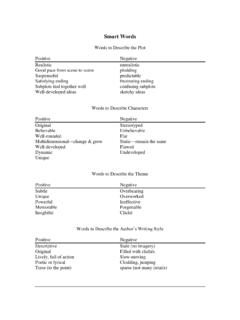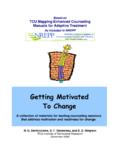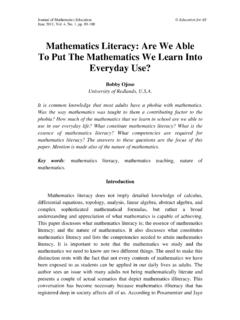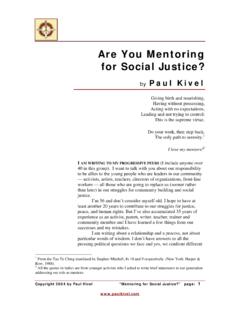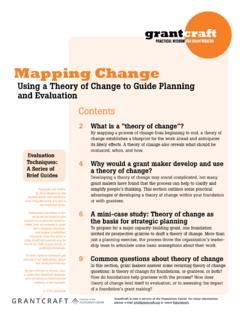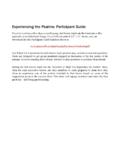Transcription of Knowledge issues, knowers and knowing - Krucli
1 TOK questions Knowledge issues, knowers and knowing The time has come, the Walrus said, To talk of many things: Of shoes and ships and sealing-wax Of cabbages and kings .. Lewis Carroll People know many things: they know when they are cold, or sick; they know if they are sad or happy, lonely or in love; they know how to make fire; they know that the sun will set and rise. Nonetheless people rarely stop to think about the processes by which Knowledge is produced, obtained or achieved, nor about why, under what circumstances, and in what ways Knowledge is renewed or reshaped by different individuals and groups at different times or from different perspectives or approaches. The questions in this guide are meant to provide opportunities to pause and reflect upon the complexity and richness of Knowledge and the process of knowing , on the scope and limits of Knowledge , as well as on the roles and responsibilities that Knowledge may bring to us as individuals, groups or communities.
2 As such, these questions focus on Knowledge issues. The use of this term Knowledge issues is an expressly wide one, the purpose of which is to allow students to undertake an exploration of a diversity of TOK questions that are relevant to them in their specific context. Precisely because of its breadth, however, it is important to provide guidance for teachers and students as to what is and, importantly, what is not a Knowledge issue . Knowledge issues Knowledge issues are questions that directly refer to our understanding of the world, ourselves and others, in connection with the acquisition, search for, production, shaping and acceptance of Knowledge . These issues are intended to open to inquiry and exploration not only problems but also strengths of Knowledge . Students sometimes overlook the positive value of different kinds of Knowledge , and the discriminatory power of methods used to search for Knowledge , to question it, and to establish its validity.
3 Knowledge issues can reveal how Knowledge can be a benefit, a gift, a pleasure and a basis for further thought and action, just as they can uncover the possible uncertainties, biases in approach, or limitations relating to Knowledge , ways of knowing , and the methods of verification and justification appropriate in different areas of Knowledge . Two examples: Consider the question , What is the value of distinguishing between what we know and what we don t know? In the context of problems of Knowledge , the emphasis is likely to be on the good reasons we have for doubting whether the lines we draw between the two are as clear as we sometimes suppose them to be. In contrast, in the context of Knowledge issues, the reasons we have to maintain the legitimacy and usefulness of the distinction are likely to come to the fore. Alternatively, consider the question , Is there one way of knowing that is best for acquiring Knowledge ?
4 In the context of problems of Knowledge , the emphasis is likely to be on why over-reliance on or confidence in each way of knowing would be unwise; in the context of Knowledge issues, reasons for relying on or trusting ways of knowing should also be considered. In the broadest understanding of the term, Knowledge issues include everything that can be approached from a TOK point of view (that is, in accordance with the TOK aims and objectives as they are formulated) and that allows a development, discussion or exploration from this point of view. For example, a simple question that is often raised by students, Are teachers course handouts and textbooks always right? , can be treated as a Knowledge issue when correctly framed in the context of TOK aims and objectives. On the contrary, it can be the prompt for entirely trivial answers that have little or nothing to do with TOK. It is to be expected that a good treatment of many Knowledge issues will necessarily deal with several aspects described above and that these can be interwoven in different, equally relevant ways.
5 For this reason the treatment of Knowledge issues can be distinguished from other issues that might arise in the context of a particular subject area. For example, a consideration of sense perception exclusively from the point of view of the psychology or biology of perception is not a TOK treatment of a Knowledge issue . Nature of knowing In English there is one word know , while French and Spanish, for example, each has two (savoir/conna tre and saber/conocer). In what ways do various languages classify the concepts associated with to know ? In English, French, Spanish or Chinese, for example, what is the relationship between the different ways of expressing know : they know of it , they know about it , they really know it , they know that person , they know that this is so , they know how to do it ? Are there other ways of using the verb to know ? How do believing that and believing in differ? How does belief differ from Knowledge ?
6 What are the differences between the following: information, data, belief, faith, opinion, Knowledge and wisdom? Knowledge communities In the TOK diagram, the centre is represented as both an individual and a group. To what extent can we distinguish between knowing as an individual and knowing as a group or community enterprise? How much of one s Knowledge depends on interaction with other knowers ? Are there types of Knowledge that are specifically linked to particular communities of knowers ? To what extent can we act individually in creating new Knowledge ? What are the strengths of working in a Knowledge community? What are the dangers? Is common sense just what is taken for granted in a community? How can we decide when to question common sense? Presented with the belief system of a community of knowers , how can we decide what we personally believe? How can we decide which beliefs we ought to check further?
7 In the end does it just amount to a question of trust? If so, how can we decide who to trust, and on which issues? Do we need to grow up in a human community in order to develop ways of knowing (sense perception, language, reason and emotion)? Or are we born hard wired to be able to use them? Is community more important in some ways of knowing than others? In what sense is a community of knowers like bees constructing the labyrinths of their hive or a group of builders constructing a building? knowers and sources of Knowledge How is Knowledge gained? What are the sources? To what extent might these vary according to age, education or cultural background? What role does personal experience play in the formation of Knowledge claims? To what extent does personal or ideological bias influence our Knowledge claims? Does Knowledge come from inside or outside? Do we construct reality or do we recognize it? Whoever acquires Knowledge and does not practise it resembles him who ploughs his land and leaves it unsown.
8 (Sa di) Are there responsibilities that necessarily come with knowing something or knowing how to do something? To whom might these responsibilities be owed? In what sense, if any, can a machine be said to know something? How can anyone believe that a machine can think? When a machine gives an instruction to press a certain button to make it work, where is that Knowledge or awareness located? Does technology allow some Knowledge to reside outside the human knower? Is Knowledge even a thing that resides somewhere? Justification of Knowledge claims If the frog tells you that the crocodile is dead, do not doubt it. What might this Ghanaian proverb suggest about who it is that provides the justification for a Knowledge claim? What is the difference between I am certain and It is certain ? Is conviction sufficient for a Knowledge claim to be validated? What are the implications of accepting passionate, personal belief as Knowledge ?
9 How are Knowledge claims justified? Are the following types of justification all equally reliable: intuition, sense perception, evidence, reasoning, memory, authority, group consensus, and divine revelation? Why should time be taken to assess critically the nature of Knowledge claims? Linking questions Do Knowledge claims transcend different communities or cultures? What differences exist between public and private justifications? To what extent might this distinction between private Knowledge and public Knowledge be culturally dependent? Do the images of a web, building blocks, concentric circles, a spiral, or a grid make a convincing description of the interconnections in the ways of knowing and areas of Knowledge ? In what ways might these metaphors be useful? To what extent is Knowledge about the past different in kind from other kinds of Knowledge ? Does making a Knowledge claim carry any particular obligation or responsibility for the knower?
10 TOK questions Ways of knowing What this guide calls ways of knowing are often so automatic that it is hard to stop the process, as it were, in order to consider them carefully. The senses, through perception, seemingly provide a window on the world as it really is, and the emotions drive us onward without always giving time for reflection. Additionally, the acquisition of a first language occurs so easily for most people, and communication with others is so natural, that the influence of language in shaping thought is not obvious. Finally, a sound argument can be recognized as such without any formal training in logic or other forms of reasoning. The questions that follow are intended to stimulate and guide reflection about these and related issues. While these four ways of knowing are the focus of this section, this should not be taken to imply either that there are only four ways of knowing , or that everything is known solely through one or other of these four ways (it may be useful to explore what other ways of knowing there might be, and how the various ways interact and overlap).
